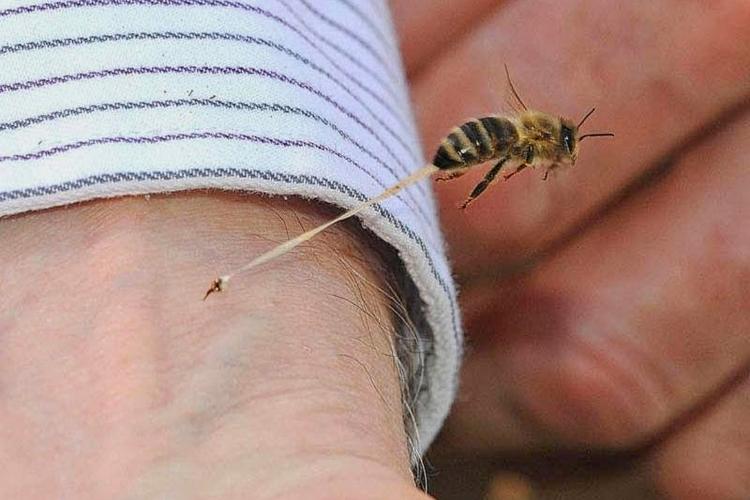Honey bees are critically important to humans. Without bees to pollinate plants, we wouldn’t be able to produce food on a large enough scale to support our substantial population.
But is the ever-important honey bee a dangerous creature? Can they kill you? And will they attack or sting you for no reason?
Typically, the answer is no – honey bees are not dangerous to humans. However, there are some exceptions. If you are allergic to bee venom, a bee sting can be harmful and even fatal. Further, if the bees are Africanized honey bees (also known as killer bees) they can be more aggressive than normal, which could result in dozens or even hundreds of stings.

Bees Are Rarely Harmful To Humans
Bees have stingers they use to defend their hive from predators. A bee’s stinger is barbed, so it becomes dislodged in the wound of the victim after a bee stings. This tears a bee’s body in half and results in their death.
A bee sting will cause a sharp immediate pain upon piercing the skin of a person. The damage of the barded sting itself is minimal. However, a bee’s stinger is attached to a sac that contains venom.
Bee venom is a mixture of different proteins and organic molecules, and is poisonous to humans. When a bee stings, the venom sac detaches along with the stinger. This enables it to continue pumping small amounts of venom into the wound.

Bee venom can cause irritation, itchiness, redness and swelling of the surrounding area. For most people, these symptoms are mild and subside within a few hours. However, some have allergic reactions to bee venom. This can include severe swelling and redness that takes days to subside.
Can Honey Bees Kill Humans?
A honey bee can kill a person if they suffer a severe allergic reaction to a sting, known as anaphylaxis. When a bee stings a person who is severely allergic, airways can be obstructed and blood pressure can plummet, leading to their death.
People only die from bee stings in rare cases. In Australia, for example, around 2 people die from bee stings each year. That is roughly the same amount of people who die from snake bites, although snake bites are far less common.
In the U.S.A, just over 60 people die from hornet, wasp and bee stings each year. For point of reference, that number is slightly higher than the 49 people who die from lightning strikes on an annual basis.
While some people can die from a bee sting, the majority of people will not suffer from anaphylactic shock. To those who aren’t severely allergic, honey bees pose little to no danger at all. It is possible for them to still die from a bee sting, but it would take hundreds if not thousands of stings to do so.
In fact, experts estimate that the average person could withstand 10 bee stings for each pound of bodyweight they have (or 4.5 stings for each kilogram). That means a person weighing 100 lbs (45 kgs) could likely be stung by 1,000 bees and still survive.
Bees Don’t Attack People For No Reason
Most honey bees are friendly and won’t attack people without cause. The same goes for animals such as dogs and cats. Bees only sting as a means of defence. It makes sense, when you consider the fact that bees die after they sting.
Bees will sacrifice their life for the safety of the colony. If a human gets too close to a hive, or displays aggressive movements such as swatting at a bee or waving their arms around, they are in danger of being stung.
That’s because a human is much larger than a bee, and could cause fatal damage to a hive if they want. Bees know this, having spent hundreds of years fighting off other large predators such as bears and skunks.
If a bee stings you, it will also release an alarm pheromone that signals to other bees that you are a threat. This means there is a higher probability of getting stung a second time.
If you are minding your own business in the first place, and not doing anything threatening to bees (like going near their hive or making aggressive movements towards them), they aren’t dangerous. They will leave you alone as long as you do the same to them.
Africanized Honey Bees Are More Dangerous Than European Honey Bees
Honey bees carry on the genetic traits of their queen (which is why you need to consider different subspecies of bees if you’re starting your own hive). This means some beehives can be more aggressive than others.
One particular subspecies of bee that some consider dangerous is the Africanized honey bee. Africanized honey bees are the result of crossbreeding between European and East African honey bees. They have thrived in the Americas since being bred in the 1950s because of higher reproductive rates, shorter developmental cycles, and lower honey-storing needs than European honey bees.
Africanized honey bees are typically more dangerous to humans than European honey bees because of their tendency to be more defensive of their hives. For example, they will sting with less provocation, call more co-attackers to join in, and chase the victim further away from the hive.
Their stings are also believed to release larger volumes of venom than European honey bees, which can cause a more severe reaction in humans. These attributes have seen them be given the nickname ‘killer bees,’ because they seemingly display a killer instinct. If a hive near your home contains a colony of Africanized honey bees that poses a threat to you or your family, you can contact a local bee removal company to come out and help.
Final Thoughts…
Bees only sting as a defensive measure. They are not dangerous to the vast majority of humans. Their stings will hurt and the venom can cause some redness or swelling, but in most cases this will subside after just a few hours.
However, some people do suffer anaphylaxis when stung by a bee. This can be incredibly dangerous, and even cause a person to die as a result. Fortunately, these cases are rare.
